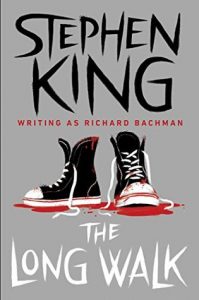The Stephen King Project – The Long Walk (1979)
About the project
I will be reading all of Stephen King’s books in order of publication (with the exception of The Dark Tower series which I will read together, at the end of this adventure) and writing a review of each. I’ll be looking at the recurring themes, the tricks he likes to use, the way he develops character and the way that his craft has evolved in the 44 years since Carrie was first published.
I’m back after a summer spent reading for the British Fantasy Awards and I’m ready to dig into some King again. As those of you who have been reading along will know, I chose not to include Rage in this project, because Stephen King himself chose to have it withdrawn from publication. Therefore, The Long Walk is the first of the Bachman books that I’ll be covering.
 It’s hard to say whether, had I read this book back when it was first published, I would have suspected that Bachman was King. I think it’s really easy to spot the clues in hindsight though. This book has a depth of character and a deceptive simplicity that I’ve come to associate with King’s writing.
It’s hard to say whether, had I read this book back when it was first published, I would have suspected that Bachman was King. I think it’s really easy to spot the clues in hindsight though. This book has a depth of character and a deceptive simplicity that I’ve come to associate with King’s writing.
The concept is straightforward; every May, 100 teenage boys enter a competition called The Long Walk. They must all walk at no less than 4 miles an hour for as long as they can. If they stop or fall below 4 miles an hour, they get a warning. After three warnings, they are shot and killed. The winner is the last boy alive and he will receive whatever his heart desires.
This is one of the King novels where the story is very contained. It’s all told from the perspective of Ray Garraty and through him we get to know a small group of the boys on this suicide quest. There’s no spooky hotel or ghosts or atmospheric house on the lake but the very direct threat of the soldiers with their rifles who keep pace with the boys throughout the walk. As the walk progresses, each boy comes to know that sooner or later his body will fail him, or his mind will break. He can only hope to outlast the others – the boys going through this ordeal with him and becoming his friends.
I’ll be honest, I can’t quite decide how I feel about this one. The ending was abrupt and ambiguous, but I think it was the right one for the book – anything else would have felt trite or anticlimactic. I loved the exploration of the reasons that the boys found themselves there – the foolhardiness of youth when we still believe that we’ll live forever, the ones who could have made it but for an accident that couldn’t have been predicted, the boys who wanted to die and knew it.
I never felt that I got to grips with why Garraty had volunteered. He didn’t seem to be sure of himself as some of the others were, and yet he didn’t seem naïve enough to think it would be easy. And he was definitely too kind for this sort of task, saving McVries when it would have made more sense to let him die.
This is a book full of dread and fear and gritty physicality, but it also addresses more philosophical topics like mortality and humanity and friendship.
The story goes that King wrote the first draft of this book while he was in college and it certainly has a certain sense of the young man – that striving for immortality, anger at the state of the world, a certain focus on the desire for sex – but in many ways it reads like the work of a more mature writer, one who knows something of the world, has experienced pain and hardship and loss, one who understands the nature of the crowd (mob) and its bloodlust. And of course the deftness of prose, the beauty of some of the descriptions, that suggests an experienced and skilled writer.
I did feel in places that the timeline was a little muddled – ten minutes seeming to take an hour while at other points hours slipped by. That could have been intentional – our own experience of time is often like this. Ten minutes waiting for something, ten minutes of discomfort, all can seem like more than an hour of contentment.
My main criticism is that for me, some of the early parts of the story dragged. I felt the pacing could have been better in the beginning and I would have like a clearer understanding of Garraty and why he was there.
All in all, though, this was an enjoyable read by a skilled writer, you could do worse than to read it.
Next up for the project is The Dark Zone, a book I have loved since I first read it while I was in my teens. I’m looking forward to rereading it in the coming days. Why not grab yourself a copy and come along for the ride?
